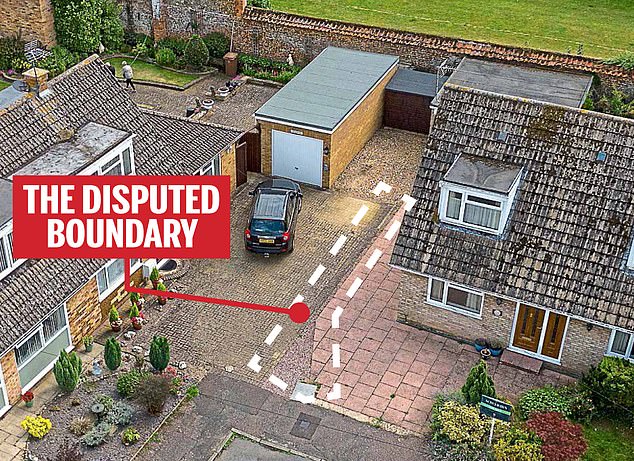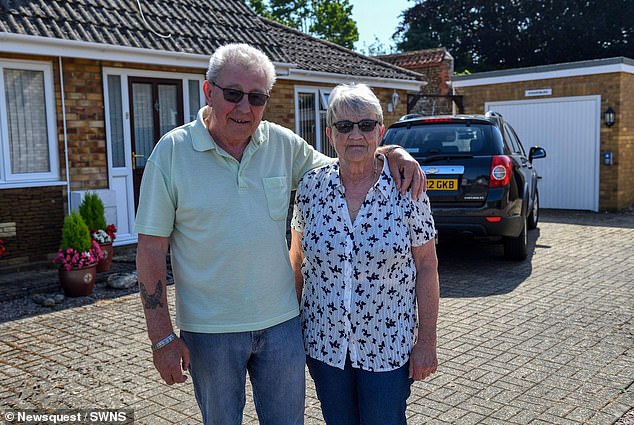According to the estate agent’s details, the three-bedroom attic bungalow occupies “a serene location at the end of a quiet cul-de-sac… in the heart of a charming seaside village.”
There is no doubt that this part of Norfolk has its attractions. Just a short distance from the sea and not far from Sandringham House, the royal family’s favourite retreat, Snettisham boasts an award-winning pub and a beautiful church whose 53-metre tower has served as a landmark for sailors navigating The Wash for almost 700 years.
However, this pretty village is the scene of a neighbourhood dispute that has dragged on for five long years. The owners of the bungalow in a cul-de-sac, currently on the market for £375,000, and the occupants of the adjacent property have become embroiled in an increasingly bitter dispute.
With lawyers, litigation and the police involved, it has reached the point where one pensioner spent 12 hours in a police cell amid the threat of legal proceedings, and he and his wife now say they are out of money.
The Batesons are worried that their new next-door neighbor might also put up a fence.
The problem that has caused so much conflict? Two small wooden fence panels, costing just £80 each.
Perhaps only in this country, where it is well known that an Englishman’s home is his castle, could a couple of nondescript pieces of wood cause so much offence.
The escalating saga has resulted in pensioners Graham and Katherine Bateson (who own the neighbouring property) spending their entire life savings of £45,000 on legal fees, with Graham also at risk of a criminal record.
The couple have not said whether they regret continuing the “fence panel war,” but it would be understandable if they did.
Apart from the financial consequences, as Mrs Bateson said: “It’s been a hell of a five-year period. The hardest thing for us is the health problems. We’re thinking about them every five minutes. We’ve just come back from holiday and as soon as we get home we’re scared because it’s so terrible.”

Wendy Leedham sadly passed away from cancer at the age of 74 in 2021, but the conflict did not end with her passing.
Ironically, it was the tranquility of the area that attracted the Batesons and led them to purchase their bungalow in 1987. Located at the end of a cul-de-sac, the couple say the property was sold as having a shared road with their neighbor and a “featureless boundary” between the two.
This was necessary, they say, because the layout of the two houses meant they had to cross part of their neighbor’s driveway to park in front of their own house.
The couple say the arrangement worked smoothly for many decades, including when Wendy Leedham and her husband Roger bought the house next door for £227,500 in 2007.
Relations were always “civilised”, and on one occasion the two couples shared the same table at another neighbour’s wedding reception. After Mr Leedham, chairman of the local school board, died in 2014, they even mowed the lawn for their widowed neighbour and kept a spare key in case of emergency.
But things suddenly took a turn for the worse, they say, after Ms Leedham got a new partner who wanted to park his car in the driveway next to hers.

The Batesons arrived home to find fencing panels being installed between their driveways.
In 2019, the Batesons were shocked to return from a hike to discover that, without warning, two panels of curved trellis timber fencing were being erected between the two properties. Bricks had been removed from the paving to accommodate the support posts.
Fearing that they would find it difficult to park their car in front of their house, the Batesons asked Mrs Leedham to stop the work.
Ms Bateson said: “I went outside and said, ‘Please stop doing that,’ and they never responded to me. We went inside and called the solicitor and that’s when all hell broke loose.”
The Batesons sought an injunction to remove the panels, arguing they were blocking their driveway, but their neighbour successfully fought the claim after obtaining legal advice telling them they could keep them.
The dispute, and its mounting costs, dragged on until both sides had to pay lawyers before resorting to mediation to try to resolve it.
Mrs Leedham sadly passed away from cancer aged 74 in 2021, but the dispute did not end with her passing. Six months after her death, mediation concluded with a ruling stating that a new deed had to be drawn up showing the boundary between the two bungalows, meaning the fence could remain standing.
But the Batesons were not willing to let things go, saying that in order for the fence to remain, mediators said their neighbors first had to conduct a property survey, which never happened.
Instead, the Batesons paid for a survey of their own.
In a written report, their surveyor concluded that the property developer intended access to be shared between the two entrances.
“Access to the Bateson driveway is to be by driving along the front of Mrs Leedham’s driveway,” he wrote in 2022. “I believe this was the developer’s original intention and it is therefore an implied easement… Features such as a fence cannot therefore be placed on the boundary.” Months later, when that also failed to satisfactorily resolve the dispute, a fed-up Mr Bateson, who has no criminal record, took matters into his own hands and removed the fence himself.
He says: “A police officer showed up and was talking to Wendy’s son. I went out to move my car and the police officer came running, grabbed me by the arm and arrested me on the spot.”
As the 75-year-old great-grandfather and former long-haul lorry driver told the Mail this week: “I was arrested for criminal damage.
‘I was taken to King’s Lynn police station where they took my DNA and fingerprints and locked me in a cell until almost midnight. There was a toilet, a blanket and a plastic bunk bed. I was locked up for 12 hours on a Sunday without food.’
While the charges were eventually dropped, after the District Attorney’s Office decided a prosecution would not be in the public interest, the matter did not end there; and with Ms Leedham’s home now up for sale, it remains unresolved.
The Batesons say they can’t relax and enjoy retirement in the home they worked so hard to buy. Although the properties are unfenced, Mrs. Bateson says she and her husband are terrified of any changes the new owners might make.
“We’re still living in fear that they’re going to put up another fence when there shouldn’t be one,” she said. “The situation is that they keep trying to force us to have a solid line between the boundaries. We don’t know where we are now. This has been chaos, torture and purgatory. Sometimes I feel like throwing myself under a bus.”
The couple say that, having exhausted their funds, they no longer have the financial means to continue fighting. Their anxiety about money and how they will fund the rest of their retirement is all-consuming.
“We’re living hand to mouth now,” said Mrs Bateson, who worked as a factory supervisor at a company that makes windows. “That money was to help us live. You don’t know when you’ll need to fix your car or need carers. Now we don’t have it, it’s all gone.”
That revelation is unlikely to generate much sympathy among those on the other side of the fence.
Although the late Ms Leedham’s family have declined to comment on the dispute, they continue to maintain she did nothing wrong and simply erected the fence for “privacy”.
“We’re not interested in stooping to Graham Bateson’s level,” said one relative. “The family is still grieving. They’ve been through this for the last four or five years while Wendy was terminally ill.”
However, many in the village sympathise with the Batesons. Rather than seeing them as the architects of their own plight, they say the housing estate they live on, which used to be owned by the council, is plagued by problems relating to access rights.

The neighbours are in solidarity and say that the entire development has confusing rights of way.
“It’s nonsense,” said parish councillor David Bocking, 90, who has lived in the village all his life. “There are other houses that have rights of way over the other houses that are on the gardens, and that also causes a lot of fuss, because the matter was never resolved when the council first sold them.”
Brenda Smith, 85, who previously lived in Mrs Leedham’s bungalow, added: “It’s a very sad situation. I feel so sorry for Kate and Graham. It’s been awful for them. They spent all that money and got nowhere. I only had the house for three years but there was no problem with the entry. It was shared.
“They are lovely people. They help anyone. I was on holiday once and my granddaughter left the door open and they came and locked it.”
As for retired police officer Martin Burden, 77, who lives with his wife in a bungalow opposite the Batesons, he says he can understand why Bateson took matters into his own hands.
“He shouldn’t have done it, but in the same situation, the owners of that property shouldn’t have torn up the bricks to put up the fence either, and nothing was done about it,” he says. “It’s totally wrecked their lives – £45,000 they don’t have now.”
An exorbitant sum to spend on an endless argument with a neighbor whom the Batesons once considered a friend.
Some links in this article may be affiliate links. If you click on them we may earn a small commission. This helps us fund This Is Money and keep it free to use. We do not write articles to promote products. We do not allow any commercial relationships to affect our editorial independence.

